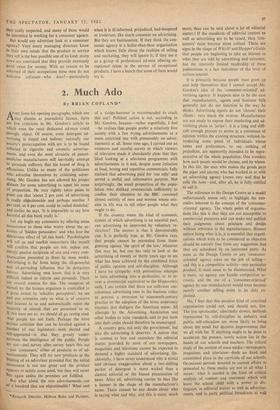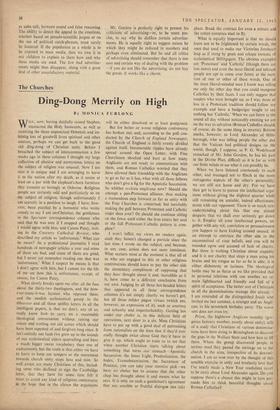2. Much Ado By BRIAN COPLAND* APART from his opening
paragraphs, which one .n.may dismiss as journalistic licence, there are few criticisms in Mr. Gordon's article to Which even the most dedicated ad-man could strongly object. Of course, some detergent ad- vertising is stupid and tedious; naturally our society's preoccupation with sex is to be found reflected in cigarette and cosmetic advertise- ments, and even the most altruistic of patent- medicine manufacturers will inevitably attempt to persuade sufferers that his brand of drug is efficacious. Unlike so many of the politicians who advertise themselves by criticising adver- tising, Mr. Gordon has not allowed his proper distaste for some advertising to upset his sense of proportion. He very rightly takes pains to point out that 'about 2 per cent. of advertising is really objectionable and perhaps another 5 per cent. or 6 per cent. coul,d be.called doubtful,' and earlier he says, 'It is impossible to say how harmful all this bunk really is.'
Let me begin my comments by offering some reassurance to those who worry about the ac- tivities of 'hidden persuaders' and who fear the deleterious effect of 'all this bunk.' Psychologists will tell us and market researchers like myself Will confirm that people are not, repeat not, Merely passive recipients of any and every corn- inunication presented to them by mass media. Advertising is far from being the all-powerful and all-pervading influence that its detractors believe. Advertising men know that it is very difficult indeed to inform and persuade. There are several reasons for this. The reception of stimuli by the human organism is controlled to a great extent by 'selective perception'; we see and pay attention only to what is of concern and interest to us and automatically reject the Majority of stimuli that are presented 'to us. If this were not so, we should all go raving mad. And people are not fools. Perhaps the most serious criticism that can be levelled against a number of our legislators—both elected and self-appointed—is that they grossly under- estimate the intelligence of the public. People are not—and survey after survey bears this out —just 'consumers,' either of products or of ad- vertisements. They will try new 'products at the bidding of an advertiser provided that the initial investment is not too great and the product appears to satisfy some need, but they will never buy again unless the promises are fulfilled.
But what about the two advertisements out of a hundred that are objectionable? What sort *Research Director, Hobson Bates and Partners. of a sledge-hammer is recommended to crack this nut? Political action is out, according to Mr. Gordon, because—rather regretfully, I feel —be realises that people prefer a relatively free society with a few trying advertisements to a more restricted one with presumably no adver- tisements at all. Some time ago, I carried out an extensive and careful survey in which viewers of television made it abundantly clear that they liked looking at a television programme with advertisements in it and, despite some irritation at loud, boring and repetitive commercials, fully realised that advertising paid for 'our telly' and served a useful and informative purpose. Not surprisingly, the small proportion of the popu- lation who disliked commercials sufficiently to confine their attention to the BBC consisted almost entirely of men and women whose mis- sion in life was to tell other people what they ought to do.
If the country wants the kind of economic system of which advertising is an essential part, can advertising be improved by voluntary re- striction? The answer is that it demonstrably can. It is perfectly true, as Mr. Gordon says, that people cannot be prevented from trans- gressing against 'the spirit of the law,' whatever that may be, but one has only to look at the advertising of twenty or thirty years ago to see what has been achieved by the combined force of public opinion and self-discipline. Although I have no sympathy with pretentious attempts to turn advertising into a profession, or to in- vent a commercial equivalent to the Hippocratic oath, I am certain that there are sufficient con- scientious advertising men in the business today to prevent a reversion to nineteenth-century practice or the adoption of the more unsavoury excesses that disfigure the American scene. All attempts by the Advertising Association and other bodies to raise standards and to put teeth into their codes should therefore be encouraged.
A country gets, not only the government, but also the advertising it deserves. A nation that is content to buy and assimilate the editorial matter provided by most of our newspapers, magazines and television cannot be expected to demand a higher standard of advertising. (In- cidentally, I have never understood why a trivial and obvious exaggeration about a two-shilling packet of detergent is more wicked than a slanted editorial or the biased presentation of news. After all, advertising carries its bias like a banner in the shape of the manufacturer's name. There cannot be any doubt about who is saying what and why, and this is more, much more, than can be said about a lot of editorial matter.) If the standards of editorial content as well as advertising are to be raised, then 'con- sumers' must become more critical. There are signs in the shape of Which? and Shopper's G uide that people are beginning to take an interest in what they are told by advertising and salesmen; but the relatively limited readership of these publications is a fair indication of the level of serious interest.
It is primarily because people must grow up and help themselves that I cannot accept Mr. Gordon's idea of the 'consumer-oriented' ad- vertising agency. It happens also to be the case that manufacturers, agents and business folk generally just do not function in the way he thinks. Advertising agents do not 'choose' their clients: very much the reverse. Manufacturers are not ready to expose their marketing and ad- vertising• plans to 'juries': it is a long and diffi- • cult enough process to arrive at a consensus of opinion within the existing structure, without in- troducing some panel of individuals whose tastes and preferences, to say nothing of prejudices, are apparently intended to be repre- sentative of the whole population. One wonders how such panels would be chosen, and by whom. In this life, the man who makes the goods pays the piper and anyone who has worked in or with an advertising agency knows very well that he calls the tune—and, after all, he is fully entitled to call it.
The reference to the Design Centre as a model unfortunately seems only to highlight the ano- malies inherent in the concept of the 'consumer- oriented' agency. The whole point of organisa- tions like this is that they are not susceptible to commercial pressures and can make and publish their judgments about products and design without reference to the manufacturers. Human nature being what it is, it is essential that organi- sations which wish to be considered as objective should be entirely free from any suggestion that they are subsidised by an interested party. As soon as the Design Centre or any 'consumer- oriented' agency takes on the job of selling— and this is a competitive activity—any particular product, it must cease to be disinterested. What is more, no agency can handle competitive ac- counts, and the use of a 'consumer-oriented' agency by one manufacturer would soon become merely another selling point to be duly ex- ploited.
No, I fear that this peculiar kind of contrived organisation could not, and should not, live. The less spectacular, admittedly slower, methods represented by self-discipline in industry and public self-education are more likely to bring about the small but decisive improvement that we all wish for. If anything ought to be done to accelerate the process, surely action lies in the hands of our schools and teachers. The critical study of the content of mass media—newspapers, magazines and television—finds no fixed and established place in the curricula of our schools. Occasional periods devoted to current affairs as presented by these media are not at all what I mean: what is needed is the kind of critical analysis of content and treatment which will leave the school child with a power to dis- tinguish, in editorial matter as well as advertise- ments, and in party political broadcasts as well as sales talk, between sound and false reasoning. The ability to detect the appeal to the emotions, whether based on pseudo-scientific jargon or on the use of political catch-phrases, must surely be fostered. If the population as a whole is to be exposed to mass media, then we owe it to our children to explain to them how and why these media are used. The few bad advertise- ments might then disappear, along with a great deal of other unsatisfactory material. Mr. Gordon is perfectly right to present his criticisms of advertising—or, to be more pre- cise, to say why he dislikes certain advertise- ments. He is equally right to suggest means by which they might be reduced in numbers and perhaps even eliminated. But he and all critics of advertising should remember that there is one sure and certain way of dealing with the problem —if you do not like the advertising, do not buy the goods. It works like a charm.































 Previous page
Previous page